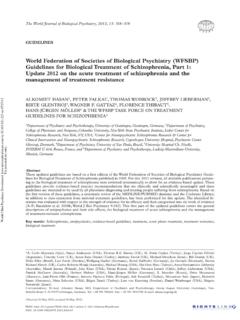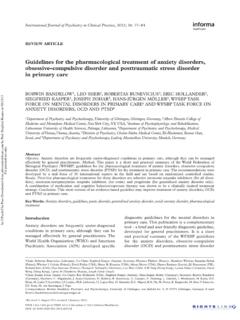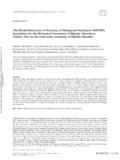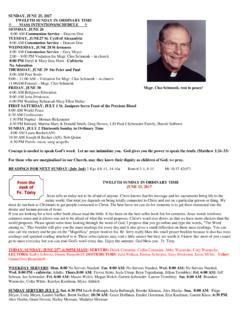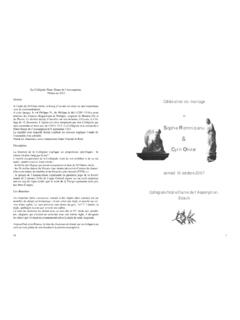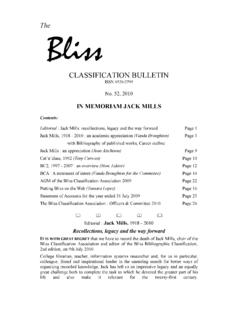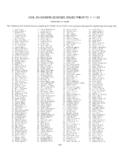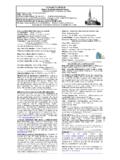Transcription of World Federation of Societies of Biological …
1 GUIDELINES World Federation of Societies of Biological Psychiatry (WFSBP) Guidelines for Biological treatment of unipolar depressive disorders , Part 1: Update 2013 on the acute and continuation treatment of unipolar depressive disorders MICHAEL BAUER 1 , ANDREA PFENNIG 1 , EMANUEL SEVERUS 1 , PETER C. WHYBROW 2 , JULES ANGST 3 , HANS-J RGEN M LLER 4 on behalf of the Task Force on unipolar depressive disorders * 1 Department of Psychiatry and Psychotherapy, Carl Gustav Carus University Hospital, Technische Universit t Dresden, Dresden, Germany, 2 Department of Psychiatry and Biobehavioral Sciences, Semel Institute for Neuroscience and Human Behavior Los Angeles, University of California Los Angeles (UCLA), Los Angeles, CA, USA, 3 Department of Psychiatry, University of Z rich, Z rich, Switzerland, and 4 Department of Psychiatry, University of Munich, Munich, Germany Abstract Objectives.
2 This 2013 update of the practice guidelines for the Biological treatment of unipolar depressive disorders was developed by an international Task Force of the World Federation of Societies of Biological Psychiatry (WFSBP). The goal has been to systematically review all available evidence pertaining to the treatment of unipolar depressive disorders , and to produce a series of practice recommendations that are clinically and scientifi cally meaningful based on the available evidence. The guidelines are intended for use by all physicians seeing and treating patients with these conditions. Methods . The 2013 update was conducted by a systematic update literature search and appraisal. All recommendations were approved by the Guidelines Task Force. Results . This fi rst part of the guidelines (Part 1) covers disease defi nition, classifi cation, epidemiology, and course of unipolar depressive disorders , as well as the management of the acute and continuation phase treatment .
3 It is primarily concerned with the Biological treatment (including antidepressants, other psychopharmacological medications, electroconvulsive therapy, light therapy, adjunctive and novel therapeutic strategies) of adults. Conclusions . To date, there is a variety of evidence-based antidepressant treatment options available. Nevertheless there is still a substantial proportion of patients not achieving full remission. In addition, somatic and psychiatric comorbidities and other special circumstances need to be more thoroughly investigated. Therefore, further high-quality informative randomized controlled trials are urgently needed. Key words: Major depressive disorder, acute treatment , continuation treatment , pharmacotherapy, antidepressants * Michael Bauer, Germany (Chair), Jules Angst, Switzerland (Co-Chair), Andrea Pfennig and Emanuel Severus, Germany (Secretary), Mazda Adli (Germany), Ian Anderson (UK), Jos L.
4 Ayuso-Gutierrez (Spain), David Baldwin (UK), Per Bech (Denmark), Otto Benkert (Germany), Michael Berk (Australia), Istvan Bitter (Hungary), Tom Bschor (Germany), Graham Burrows (Australia), Giovanni Cassano (Italy), Marcelo Cetkovich-Bakmas (Argentina), John C. Cookson (UK), Delcir da Costa (Brasil), Mihai D. Gheorghe (Romania), Heinz Grunze (UK), Gerardo Heinze (Mexico), Teruhiko Higuchi (Japan), Robert Hirschfeld (USA), Cyril H schl (Czech Republic), Edith Holsboer-Trachsler (Switzerland), Rhee-Hun Kang (Korea), Siegfried Kasper (Austria), Cornelius Katona (UK), Martin B. Keller (USA), Selcuk Kirli (Turkey), E. Kostukova (Russia), Parmanand Kulhara (United Arab Emirates), David J. Kupfer (USA), Min-Soo Lee (Korea), Brian Leonard (Ireland), Rasmus W. Licht (Denmark), Se-Won, Lim (Korea), Odd Lingjaerde (Norway), Chia-Yih Liu (Taiwan), Henrik Lublin (Denmark), Julien Mendlewicz (Belgium), Philip B.
5 Mitchell (Australia), Hans-J rgen M ller (Germany), Jong-Woo Paik (Korea), Yong Chon Park (Korea), Eugene S. Paykel (UK), Stanislaw Puzynski (Poland), A. John Rush (USA), Janusz K. Rybakowski (Poland), Isaac Schweitzer (Australia), Andr Tadi (Germany), Andre Tylee (UK), J rgen Un tzer (USA), Per Vestergaard (Denmark), Eduard Vieta (Spain), Peter C. Whybrow (USA), Kazuo Yamada (Japan), Aylin Yazici (Turkey).Correspondence: Michael Bauer, , , Professor of Psychiatry, Department of Psychiatry and Psychotherapy, Universit tsklinikum Carl Gustav Carus, Technische Universit t Dresden, Fetscherstr. 74, D-01307 Dresden, Germany. Tel: 49 351 4582772. Fax: 49 351 4584324. E-mail: (Received 6 May 2013 ; accepted 6 May 2013 ) The World Journal of Biological Psychiatry, 2013; 14: 334 385 ISSN 1562-2975 print/ISSN 1814-1412 online 2013 Informa HealthcareDOI: J Biol Psychiatry Downloaded from by Prof.
6 Siegfried Kasper on 08/30/13 For personal use treatment of unipolar depressive disorders : part 1 335risk of suicide, reassessing the adequacy of the diag-nosis, monitoring the patient s treatment response, side effects and general medical condition, and edu-cating patients and families as to the importance of adhering to treatment . The ultimate goal of the acute treatment phase is remission. After a period of about 2 weeks of anti-depressant treatment , response should be evaluated and if insuffi cient, optimization strategies should be implemented. At least 8 10 weeks may be required to achieve maximum symptom reduction which is necessary before entering the continuation phase of treatment . The more severe the depression is, the greater the potential benefi ts are that can be derived from adequate treatment .
7 The goal of continuation treatment is to prevent a relapse, to eliminate any residual symptoms, and to restore the patient s prior level of psychosocial and occupational functioning. Maintenance (prophylactic) treatment is aimed at preventing a new episode of depression and suicide (see Part 2 of these guidelines). Successful treatment of depressed patients with antidepressants includes educating the patients and the families about available treatment options, time to onset of response and noticeable signs of it, early side effects and what to do about them, and the expected course of treatment . Biological treatment recommendations Antidepressants are the fi rst-line treatments for a major depressive episode (moderate to severe depres-sive episode) in the context of Major depressive Disorder.
8 Depending on individual characteristics and/or patient requests, antidepressant treatment might also be indicated in mild depressive episodes, but, in many such cases, psycho- and socio therapeutic approaches alone may be suffi cient. Factors to take into account when choosing an antidepressant are: the patient s prior experience with medication (response, tolerability, adverse effects), concurrent medical conditions and use of non-psychiatric drugs, a drug s short- and long-term side effects, toxicity of overdose in patients at risk of suicide, the physician s own experience with the medication, the patient s history of adherence to medication, history of fi rst-degree relatives respond-ing to a medication, patient preferences, potential budgetary constraints, availability of specifi c antide-pressants, and license of compound.
9 No single class of antidepressants has proven to be more effective or have a more rapid onset than any other, although some tricyclic antidepressants (TCAs) (amitriptyline and clomipramine), and Summary This 2013 update of the practice guidelines for the Biological treatment of unipolar depressive disorders was developed by an international Task Force of the World Federation of Societies of Biological Psychia-try (WFSBP). The goal for developing the original guidelines in 2002 and the 2007 version for use in primary care has been to systematically review all available evi-dence pertaining to the treatment of unipolar depres-sive disorders , and to produce a series of practice recommendations that are clinically and scientifi -cally meaningful based on the available evidence.
10 The 2013 update was conducted by a systematic update literature search and appraisal. All recom-mendations were approved by the Guidelines Task Force. The guidelines developed are intended for use by all physicians seeing and treating patients with these conditions. This fi rst part of the guidelines (Part 1) covers disease defi nition, classifi cation, epidemiol-ogy, and course of unipolar depressive disorders , as well as the management of the acute and continua-tion phase treatment . It is primarily concerned with the Biological treatment (including antidepressants, other psychopharmacological medications, electro-convulsive therapy, light therapy, adjunctive and novel therapeutic strategies) of adults. Executive summary of recommendations General recommendations For patients who meet diagnostic criteria for depres-sive episode (ICD-10) or major depressive disorder (DSM-IV-TR), Biological treatment (pharmacologi-cal and non-pharmacological approaches) should, in general, be considered.

